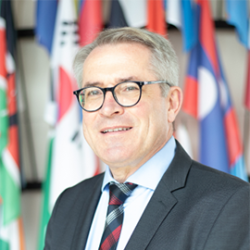From loss and waste to wealth: how industrial innovation can end world hunger
Posted: 29 September 2025 | | No comments yet
Investing in efforts to help feed our fellow man should be a no-brainer, but Professor Christopher Elliott and Gunther Beger, Managing Director at UNIDO, assert that the benefits don’t stop there…


Over 1 billion tonnes of food are lost or wasted each year, while 700 million people go hungry. Industrial innovation and global partnerships offer solutions to transform supply chains and fight hunger.
How many of you know that 29 September is designated as International Day of Awareness of Food Loss and Waste? Its purpose is to raise global awareness of the urgent need to cut food loss and waste across supply chains, ranging from postharvest handling issues right through to consumer behaviour. Over a billion tonnes of food was wasted in 2022 across households, food service and retail – enough to feed over a billion people each year based on average global dietary needs. Yet the Food and Agriculture Organization (FAO) estimates that around 700 million people – ie, nearly nine percent of the world’s population – faced hunger in 2024. This appears to be one of the most scandalous paradoxes of our time. Yet despite the scale of the social, environmental and economic costs, the political and industrial momentum to address the issue has only just begun to take off.
Investing in efforts to help feed our fellow man should be a no-brainer, but the benefits don’t stop there…”
In the past decade, policymakers have been trying to address the food security challenge from an availability perspective in developing countries. The activities of the FAO have been decisive in increasing global agricultural productivity. However, food loss and waste poses challenges in terms of economic development, climate change and public health.
Aiming to tackle the root of the problem is the United Nations Industrial Development Organization (UNIDO). This UN agency has a rather unique mandate to foster sustainable industrialisation and it has placed food loss and waste (FLW) at the centre of its new strategic agenda. Its goal, while ambitious, is widely considered to be essential. The mobilisation of governments, different sectors of industry and civil society is key to transforming food systems in ways that dramatically reduce loss and waste. One of the major outcomes of this will be advancing the global fight against hunger.
Join our free webinar: Rethinking Listeria monitoring: faster, simpler solutions for food safety & environmental testing
Discover how modern Listeria monitoring solutions can support faster, more reliable food and environmental testing, and help elevate your laboratory’s efficiency and confidence in results.
Date: 18 March 2026 | Time: 15:00 GMT
The global food security challenge
While the figure of around 700 million going to bed hungry each night is a gruesome statistic, even worse is that globally over 2.3 billion people have been classified as moderately or severely food insecure, with 2.6 billion unable to afford a healthy diet. These are not abstract statistics; they represent the daily struggle of families in Africa, Asia and Latin America whose fundamental human right to food remains unfulfilled.
Yet the world is literally awash with food being lost or discarded.


Children across Africa, Asia, and Latin America face daily hunger, highlighting the human impact of global food insecurity. Credit: Shutterstock
Here are some more staggering numbers that help explain why: Around 13 percent of food produced globally is lost during harvesting, storage, processing and transportation. Can you think of any other industry that would have comparable losses? To compound this, approximately 19 percent of the food available to consumers is wasted at retail, food service and household levels. These phenomena are referred to as ‘the dual burden of food loss and food waste’ helping to shine a light on the structural inefficiencies of agrifood systems that currently exist.
There is also a great divide in this dual burden.
The postharvest losses as mentioned predominate in low-income countries where fragile and inadequate infrastructure and poor preservation technologies prevail. But the second of the burdens, business and consumer waste, reside fairly and squarely in the wealthier nations. More shocking statistics reveal that Europe and North America see per capita food waste at retail and households that exceed 280 kilograms annually per person.
Around 13 percent of food produced globally is lost during harvesting, storage, processing and transportation… approximately 19 percent of the food available to consumers is wasted at retail, food service and household levels.”
Some academics and government officials try to separate food security and environmental sustainability, which is both misguided and naïve. Let’ us consider FLW, which is estimated to be responsible for 8–10 percent of global greenhouse gas emissions and consumes a quarter of the world’s freshwater as well as 23 percent of all global manufactured fertiliser.
In terms of agricultural land use – which is under continuous threat from various sources, not least climate change – up to 30 percent of it produces no nutritional value at all.
If this raft of data is not compelling enough then think of FLW in economic terms as a $1 trillion annual market failure.
From recognition to action: the UNIDO response
Over the past 12 months, a series of international milestones has sharpened the focus on FLW. At the World Without Hunger Conference in November 2024, UNIDO and FAO launched a landmark study with six key recommendations, ranging from better handling practices and packaging to structural transformation through industrialisation. The same meeting produced the Addis Ababa Call to Action – a roadmap urging the international development community to scale up investment in agro-industrialisation.
Then, at the UN Food Systems Summit Stock-take this July, UNIDO unveiled its Food Loss and Waste Strategy and Action Plan. This plan consolidates evidence from its joint research activities with FAO and outlines ten priority actions. At its very core is the recognition that industrial solutions are indispensable and without these, FLW will simply continue to sap productivity, exacerbate hunger and further drive environmental degradation.
While a wide range of approaches could be adopted, UNIDO has identified four that are central to driving change for good:
- Addressing the ‘hidden middle’ of the value chain, where inadequate processing, packaging and cold storage lead to massive losses
- Bridging the ‘triple gap in finance’, ensuring resources are available for smallholders, SMEs and governments to invest in practical solutions
- Building agro-industrial parks and centres of excellence, where technology transfer, training and innovation are integrated into local food systems
- Strengthening food safety and quality compliance so that food not able to be exported due to not meeting importers’ standards can still serve domestic markets safely.
Addressing complex challenges, such as those in food systems, requires clear action points and recommendations. UNIDO has developed ten recommended actions as part of its FLW Action Plan:
- Scale up investments in infrastructure
- Expand agribusiness transformation hubs and centres of excellence
- Expand UNIDO’s activities in food safety
- Scale UNIDO programmes and activities in food packaging
- StrengthenUNIDO’s normative role in food loss and waste
- Expand UNIDO’s cooperation with research and technology institutions
- Strengthen UNIDO’s cooperation with other UN agencies
- Strengthen UNIDO’s cooperation with private sector and private foundations
- Strengthen UNIDO’s cooperation with international financial institutions and national development banks to scale up investments in addressing food loss and waste
- Use international funds to develop programmes for food loss prevention.
If we start to think about FLW reduction in a profoundly different way – ie, as an important driver of sustainable industrialisation – then the whole debate moves from being a marginal issue to a core economic and industrial necessity that will drive increased productivity and profits. Success can only happen through close collaboration between UN agencies, including UNIDO, FAO and WFP – alongside the private sector.
Why the private sector must lead
As with many aspects of our food system, governments and UN agencies alone cannot resolve FLW; we often use the phrase. ‘global food security needs a global business plan’. Many actors in the private sector – especially the larger ones such as food processors, packaging companies, logistics firms and retailers – have access to a range of technologies, expertise and investment power that could reshape supply chains. Yet they often fail to employ them, considering them additional costs to their business rather than opportunities. Too often it would seem that businesses treat food waste initiatives as corporate social responsibility bolt-ons, rather than hidden opportunities to unlock new markets and drive efficiencies.
The Addis Ababa Call to Action provides a compelling blueprint for industry engagement, calling for partnerships that extend beyond philanthropy into co-development, investment and technology transfer. For companies, the value proposition should be clear: reducing FLW will not only improve resilience and security of supply, but will cut costs, mitigate reputational risks and align with consumer demand for sustainable practices.
Through its mandate, UNIDO offers the private sector a trusted entry point into emerging markets. By partnering on agrifood processing, mechanisation , innovation hubs or packaging initiatives, companies can scale their impact while accessing new opportunities in regions where postharvest losses remain highest. It is clear that in low-income countries, even modest improvements in storage, transport and processing can translate into millions of tonnes of saved food, millions more in profits and millions of improved lives. Is this anything other than a win-win?
The ‘let’s do nothing’ consequences
Hopefully this article has conveyed the scale of the problem; the urgency to rectify FLW and the enormous opportunities this presents. On the urgency front, this cannot be overstated. Every day of every month households alone throw away the equivalent of one billion meals. Soil erosion linked to unsustainable practices costs nearly $400 billion annually, while water scarcity linked to wasted food drains another $164 billion. There is growing evidence that the combined toll of environmental degradation, social instability and economic inefficiency is destabilising communities and fuelling conflict and likely mass migration. Our global food crisis increases in severity and scale as conflicts, climate shocks and economic volatility pile pressure upon pressure on a myriad of supply chains. Some of these, in the not-too-distant future, may well collapse.
A call to arms
Many see ending hunger as a charitable aspiration to which we donate some cash when we can. But it goes far beyond this: it is an absolute necessity for political stability, economic prosperity and planetary health.
We have come to the opinion that cutting food loss and waste is one of the most immediate, cost-effective levers we have to advance. We write this article to help raise awareness of the issue, but it will not be achieved through awareness campaigns alone. Reducing FLW demands action on a large and organised scale; it requires a range of industrial solutions, supported by scaled investment and equally important cross-sector partnerships.
To take action, UNIDO has proffered an open invitation to work with them on development programmes where the private sector can:
- share best practices through UNIDO Solutions Platform https://www.unido.org/solutions
- innovate and co-create solutions addressing development challenges in developing countries
- scale sustainable solutions and investments through partnership with international financial institutions (IFIs)
- solve complex challenges related to food security, including food loss and waste or food safety
- directly invest in activities related to food security.
What is very apparent is that UNIDO’s new strategic approach is not just about reducing waste; it is about creating value from being more efficient. By treating FLW as an industrial challenge and opportunity rather than a moral obligation, doors to existing and future solutions that can feed millions, protect ecosystems and strengthen economies can be opened wide.
Meet the authors
Professor Chris Elliott


Chris is Professor of Food Safety and Founder of the Institute for Global Food Security at Queen’s University Belfast. He served as Pro Vice Chancellor responsible for the Medical and Life Sciences Faculty between 2015 and 2018 and has published more than 450 peer-reviewed articles, many of them relating to the detection and control of agriculture, food and environmental contaminants.
His main research interests are in the development of innovative techniques to provide early warning of toxin threats across complex food supply systems. Chris led the independent review of Britain’s food system following the 2013 horsemeat scandal.
Gunther Beger


Until March 2022, Beger served as Executive Director for Germany at the World Bank Group, before which he held senior roles at Germany’s Federal Ministry for Economic Cooperation and Development and the German Federal Ministry of Food, Agriculture and Consumer Protection. From 1995-2000, he served as Head of Division for Agriculture at the German Embassy in Moscow, Russia.
Beger holds a master’s degree in agricultural economics from Rheinische Friedrich-Wilhelm-Universitaet in Bonn, Germany.
Related topics
Food Security, Food Waste, Supply chain, Sustainability, The consumer
Related organisations
Food and Agriculture Organization (FAO), international financial institutions (IFIs), national development banks, UN Food Systems Summit Stock-take, UNIDO Solutions Platform, United Nations (UN), United Nations Industrial Development Organization (UNIDO), World Food Programme (WFP), World Without Hunger Conference









